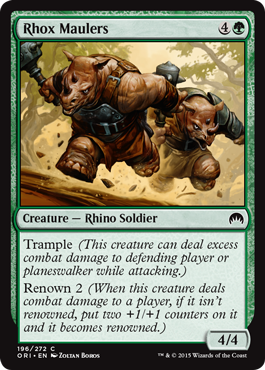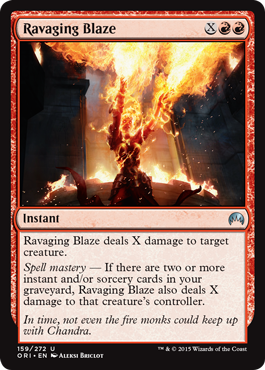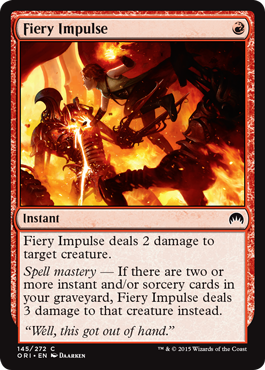Magic Origins spoiler season is upon us! The final core set is coming soon, and Wizards looks to be going out with a bang. Some sweet cards have been spoiled, most notably the double-faced planeswalkers, but this week I want to look at the two new mechanics introduced by Magic Origins. Renown and Spell Mastery both promise to be important in limited.
Let’s start with Renown. You may have heard stories of weaponsmiths or weavers known throughout the multiverse for their 1/3 bodies and marginal playability. You may also have heard stories of the exalted warriors of Bant, who do helpful things like making mana and winning when poison can’t. This story is not about any of that.
Renown is an ability similar to monstrosity from Theros, that allows a creature to upgrade itself once. You mark it with a counter and you can’t do it again. You’re either renowned or you’re not. Rhox Maulers may remind you of Ill-Tempered Cyclops, and they are quite similar cards. Instead of paying mana to turn on Renown, however, you have to attack and do combat damage to your opponent. (Well technically it still works if it attacks you, somehow.) Rhox Maulers looks sweet and will probably be quite a powerhouse common in the Magic Origins limited formats.
Unlike monstrosity, which is mostly inevitable in limited, especially sealed, Renown allows your opponent to interact. Not always in a good way, though. Do you really want to chump block to prevent a 3/3 from becoming a 4/4? Rhox Maulers has trample, however, so chump blocking isn’t going to work. Catacomb Slug will be earning plenty of overtime hours to keep the rhox out of the papers. But in general, chump blocking is not a winning limited strategy unless you are going to win in two turns, are desperate to draw a game changing card, or have a Bitterblossom (lucky!).
Knight of the Pilgrim’s Road probably won’t get chump blocked too much either, but that’s because it is like to die to anything that blocks it. Back it up with pump spells, or the tappers that seem widely available in Magic Origins, and it may be difficult for your opponent to stop the spread of your creatures’ fame. This knight looks significantly worse than Rhox Maulers, though, because it’s body doesn’t look very good with or without the extra +1/+1.
Overall, I expect Renown to be a combat mechanic that puts a lot of pressure on your opponent to have adequate defenses. The creatures appear quite efficient if they can attack and get a counter the turn after you play them. Renown looks bad in a long, stalled game, but in a protracted sealed battle of attrition, drawing one off the top can be an instant threat. Creatures with variable stats are always more powerful in limited than they seem, but I think Renown will fit more easily into aggressive strategies.
Spell Mastery, on the other hand, is a durdler’s delight. Spells that do more if you’ve already cast other spells? Sounds like a storm is coming. Storms are much more powerful in constructed than limited, though. Limited is dominated by creatures, and Spell Mastery requires multiple non-creature spells to do anything. The name almost guarantees it will suck in limited. Mastering spells is not how you win games with 40 card decks.
This card sends me to sleep. Frost Breath is generally not a great effect in limited unless you are applying pressure and tempo to win quickly. Here, you don’t even get the extra turn’s worth of tapping unless you’ve already cast two other instants or sorceries. How can you be applying pressure and winning quickly if you’re casting a bunch of instants and sorceries? The inclusion of Prowess helps here, but you still need a critical mass of creatures to be able to win quickly. Unless there are a lot of token-generating spells that can be both creatures and sorceries in your graveyard, I don’t think Spell Mastery is going to be a strategy you can build around.
Spell Mastery does introduce a strange element of complexity, however. Lorwyn block is well known for being mentally taxing because all the cards interacted with various permanents on board based on different tribal synergies between classes and subclasses. To understand a board state and read what your opponent can do, you had to process the way each permanent interacted with each other and with potential spells in hand. Spell Mastery makes you track the number of instants and sorceries in both graveyards. That’s not something you normally care about, unless you are playing Modern with Tarmogoyf and Snapcaster Mage.
What happens when a card is good enough to play without Spell Mastery, but significantly better with it turned on? Ravaging Blaze without the bonus is not as good as Volcanic Geyser, but that card was a limited powerhouse. This new spell can kill you out of nowhere, if you have a creature to target and they have two instants or sorceries in their yard. It’s not too hard to track that threshold but you will have to take notes or ask your opponent to spread out their yard for you to assess at any time.
Overall, I think Spell Mastery will be an annoying trap mechanic in limited. You probably won’t get much value out of trying to maximize it. All spell-centric mechanics are worse in limited than they seem because of the primacy of creatures to the format. But you can’t ignore it either, because powerful cards like Ravaging Blaze will just kill you unexpectedly.
Or maybe your 3/3 will get unexpectedly blown out in combat, in response to your Titanic Growth, when it turns out your opponent does have Spell Mastery turned on and therefore can kill your creature for one red mana. That’s gonna hurt.
In the end, Renown is the mechanic that will matter more for game strategy and will remain a focus of your limited practice, but you’re the painful Spell Mastery losses (and crazy wins) are going to be more famous and memorable.
Carrie O’Hara is Editor-in-Chief of Hipsters of the Coast.






